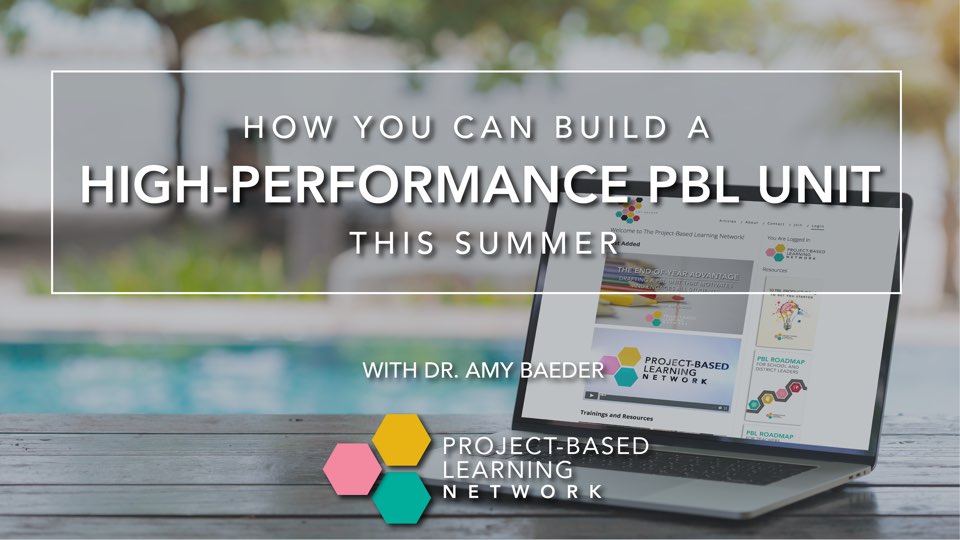What can the richest man in the world teach us about learning to do handstands?
And what does it have to do with making dramatic improvements to student learning, such as implementing high-performance PBL?

In a remarkable annual letter to Amazon shareholders (which is a normally-boring SEC requirement that I learned about from Dan Pink's excellent newsletter), Jeff Bezos shares his approach to high standards:
One thing I love about customers is that they are divinely discontent. Their expectations are never static – they go up. It’s human nature.
…
People have a voracious appetite for a better way, and yesterday’s ‘wow’ quickly becomes today’s ‘ordinary’. I see that cycle of improvement happening at a faster rate than ever before.
…
You cannot rest on your laurels in this world. Customers won’t have it.How do you stay ahead of ever-rising customer expectations? There’s no single way to do it – it’s a combination of many things. But high standards (widely deployed and at all levels of detail) are certainly a big part of it.
The same is true in schools. Our expectations for the learning experience should be going up.
And high standards—for ourselves as educators—are surely a big part of how to make it happen.
Regardless of your opinion about Amazon, I think we can agree that making “wow” learning experiences become normal and expected is worth the trouble.
In too many schools, kids are learning the way we learned decades ago. The textbooks are new (or maybe not), and the technology is new, but often the learning experience is the same.
I have enormous respect for educators, and certainly don't think teachers need to work any harder than they already are.
But the state of the art in our profession isn't advancing fast enough.
We aren't acting on what we know, and aren't implementing it with the speed our students deserve.
Yet there are encouraging bright spots. Anyone who has seen a Dave Burgess presentation or read his book Teach Like A Pirate! knows just how big a gap there is—and how big an opportunity to close that gap—between the way most students get to learn today, and what's happening in our best classrooms.
Dave asks the hard question: If students didn't have to show up to class, would they?
Students aren't exactly our customers, but they deserve our best. They deserve remarkable learning experiences, which we can only provide if we hold ourselves to high standards.
I believe one of the most promising—and most fundamental—changes we can make for students is to implement high-performance project-based learning in every school.
More on that in a moment, but first, let's look at what hasn't worked.
Misguided Attempts at High Standards
Let's talk about what has NOT brought about a revolution in engaging learning.
First, we've tried accountability.
I believe there's a role for accountability in ensuring quality learning outcomes for all students, but the net effect of the accountability movement—with its pressure to cover standards and prepare students for tests—has probably been to make learning LESS relevant, engaging, and enjoyable for students.
When we pressure educators to focus on getting kids to pass the test, the best parts of learning are often the first to go.
Second, we've tried a mind-numbing array of improvement initiatives. Teachers today have been through far more initiatives than ever before—many focused on instruction, and many others focused on other aspects of supporting student learning.
By and large, these are good improvements to make. As a profession, we're improving our schools faster than perhaps ever before.
But is the student learning experience improving? Are our customers' expectations being fulfilled?
If you visit a school today, you'll see largely the kinds of learning you saw 30 or 40 years ago.
Better, but not “Amazon Prime” better.
Remember ordering stuff by mail from catalogs and magazines? Remember “Allow 6-8 weeks for delivery”?
Last night, I noticed we needed more AAA rechargeable batteries for the kids' flashlights, so I ordered some, on my phone, from Amazon Prime. They'll be here tomorrow, with free shipping, and no need to go to the store. I could have put batteries on the shopping list for the week, but that would take just as long as actually buying them from Amazon.
Again, we can argue about whether this is good for society, the local economy, and so forth, but it's an undeniably better customer experience.
Are we giving students the same improvements in their learning experience?
Not yet. We need higher standards for our profession—not with more initiatives or more accountability or longer hours for teachers.
So how? Let's return to the Amazon CEO's annual letter.
How to Master the Perfect Handstand
A close friend recently decided to learn to do a perfect free-standing handstand. No leaning against a wall. Not for just a few seconds. Instagram good.
She decided to start her journey by taking a handstand workshop at her yoga studio. She then practiced for a while but wasn’t getting the results she wanted. So, she hired a handstand coach. Yes, I know what you’re thinking, but evidently this is an actual thing that exists.
In the very first lesson, the coach gave her some wonderful advice. “Most people,” he said, “think that if they work hard, they should be able to master a handstand in about two weeks. The reality is that it takes about six months of daily practice. If you think you should be able to do it in two weeks, you’re just going to end up quitting.”
Unrealistic beliefs on scope – often hidden and undiscussed – kill high standards.
To achieve high standards yourself or as part of a team, you need to form and proactively communicate realistic beliefs about how hard something is going to be – something this coach understood well.
I love that line: “you need to form and proactively communicate realistic beliefs about how hard something is going to be.”
I love it because it rings a curriculum and instruction bell for me as a principal.
When my school adopted Lucy Calkins' Units of Study for Teaching Writing (AKA the Teachers College Writer's Workshop curriculum), we knew it was going to be hard.
We knew it would represent a dramatic and fundamental shift in how we taught writing.
We knew it would take years of professional development, coaching, practice, and relentless attention to detail.
And it paid off marvelously. I saw third-grade essays that would get kids into most colleges.
So again, how do we make learning experiences like this the norm?
PBL and the Truth about High Standards
I think we often get high standards wrong—as if being hard on teachers, making them fear for their jobs, and making them cram more and more into their already-packed days is what it takes.
Bezos identifies four elements of high standards:
- They are teachable
- They are domain-specific
- We must recognize them
- We must coach people on their scope
In other words, we can bring about dramatic improvements, as long as we're willing to teach people what to do, and not assume that excellence in one area will spill over into excellence in another. When we know what we're looking for, and have a realistic sense of what it takes to get good, we can get good.
Again, I saw this firsthand with Writer's Workshop.
And I'm seeing it right now with Project-Based Learning (PBL).
Recently, one of the teacher teams Dr. Amy Baeder has been working with for the past two years completely “PBL-ified” their curriculum.
The whole thing—the entire year, across two teachers, three grade levels, and nine interdisciplinary projects—it's entirely project-based, standards-based, and aligned to the unique goals and resources of their school.
The projects students do are motivating, engaging, rigorous, and a whole lot of fun. More to the point, student learn incredibly well under these conditions.
As kids, few of us experienced learning like this.
And still today, few kids experience learning like this.
Why? Because it's hard. And too often, we don't really understand what that means for us as educators.
Understanding the Scope of “Hard But Worth It” Improvements
As administrators, we often downplay the hard work that will be involved in an improvement like PBL.
We know teachers generally go with the flow and figure it out whenever we promote a new idea. (As administrators, we do the same thing with district initiatives.)
And teachers generally know that any given initiative will be quickly followed by another, so why bother putting up a fight?
Well, here's why it's worth putting up a fight: if we want to do something hard and do it well, so students can benefit, we must be brutally honest about scope:
- How much time will this take to master?
- What will we need to say no to in order to succeed with this?
- What resources will we need to allocate?
Again, it's easy for leaders to gloss over these questions, in the hopes that people will figure it out and make it work.
I don't know much about how Amazon works, but I'm pretty sure Bezos didn't sit down with one team of engineers and tell them
“OK everybody, let's design an e-reader, and a tablet, and a voice assistant, and a video streaming service. Those are all really important, so we're going to have to work really hard to make it all work. You have two weeks.”
No. He was probably very realistic about how much work it would take to develop the Kindle and the Kindle Fire and Alexa and all the many other projects Amazon has brought to life.
He had different teams of people working on these projects, over periods of years and even decades.
And you may be thinking “Yeah, but he has tons of money. Schools don't have those kinds of resources to throw at their initiatives, and we can't go that slow!”
Of course schools don't have the resources Amazon has, and that's precisely the point.
Our unique goals and constraints force us to be even more deliberate about defining the scope of our work.
The school Amy has been working with has succeeded at PBL because they knew the scope of what they were getting into, they committed to the work, they developed the skills, and they saw it though.
A Realistic Scope for PBL This Summer
This summer, your school can make dramatic advances in project-based learning by focusing on the domain-specific, teachable skills that teachers must master.
We can show you how to recognize these skills, and how to be realistic about the scope of the hard work that PBL entails.
If your school is relatively new to PBL, we recommend having teachers develop one high-quality PBL unit, from start to finish, this summer.
And in a free webinar, Dr. Amy Baeder will guide you through it, sharing her PBL roadmaps for both teachers and school leaders. You'll walk away from this webinar with a clear understanding of the scope of this work—it's hard, but worth it.
How You Can Build A High-Performance PBL Unit This Summer
In this webinar, you'll learn why summer is the perfect time to build a high-performance PBL unit from start to finish. We'll explore:
